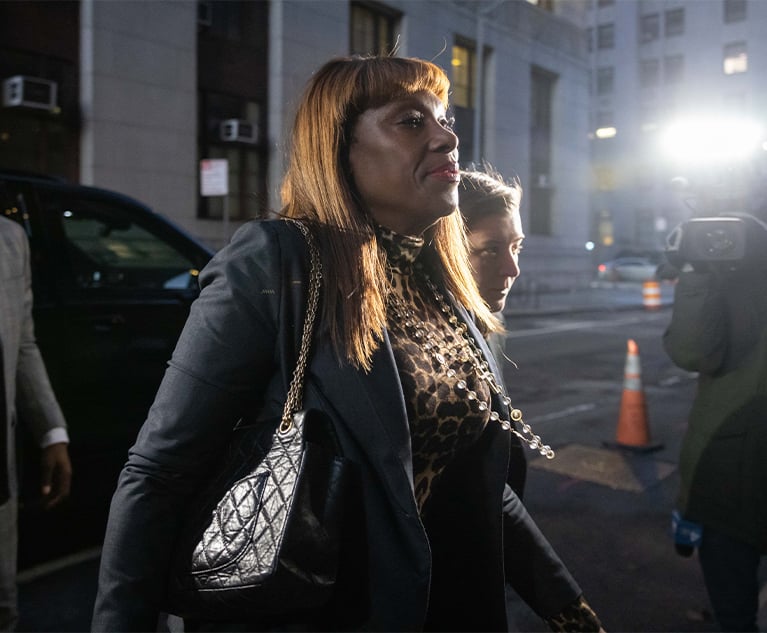Law Information Voice App Wins New York's Global Legal Hackathon
Created by two legal tech professionals, RightsNow took first place in the competition, while blockchain-powered CLE management platform Credible came in as runner-up.
March 02, 2018 at 12:00 PM
5 minute read
The original version of this story was published on Legal Tech News

The “Global Legal Hackathon” held the first round of its legal tech development competition from Feb. 23 to 25. Winning teams were chosen by local judges in over global 40 cities to go on to compete in the second round, which will narrow down teams to one per country.
At the local New York City hackathon event, which was held in the corporate headquarters of American Express, the focus was on using novel technology to expand access to legal information.
RightsNow, a prototype for an easy-to-understand legal knowledge repository accessible through voice services like Apple's Siri, Amazon's Alexa or Google Home, was chosen to go on to the second round.
The local event judges, who relied on the Global Legal Hackathon's standardized judging criteria, included founders of the Delaware Blockchain Initiative, High Performance Counsel and IBM Watson, as well as executives from Barclays and American Express.
RightsNow was the brain child of a duo of legal tech professionals: Maximilian Paterson, senior director of education and community programs at Neota Logic, and Matthew “Zeke” Hughes, senior director of business development at Mindcrest.
Paterson noted that by using interactive and voice-activated services, “you can actually give law information on a very human level and it's accessible. So it's not only access to justice but accessibility to justice as well.”
The team, he added, was trying to solve the problem of the law being out of reach to those outside the legal profession. “Sometimes there are a lot of barriers to law, especially the common law,” Paterson said. “It doesn't just live in statutes and regulations, but also in case law and judicial decisions and interpretations. And lawyers have traditionally been the gatekeepers of that.”
Improving access, Hughes said, had several key benefits for the everyday person. “It saves time by not having to shift through all the information that Google will provide,” and saves money by not having to rely on an attorney for every piece of legal information.
And more importantly, it “provides security in instances where people do not know their rights, so they will now have access in real-time way to receive that information back,” he said.
For now, the app is still in its early design stages, with Hughes and Paterson working through the initial considerations of bringing the product to market.
“Considering we're five days into the start of the company, we're deep into R&D mode right now,” Paterson said.
One of the many challenges the team will have to figure out is how to translate often obscure and technical legalese into a language that is accessible and readily understood. But Hughes noted that there are already movements to make legalese more accessible with things like “simple language contracts. And all these movements that have come forward, we are hoping we can piggy back on and support, because I think they would be very crucial to our product, and we would be adding to them as well.”
The idea to use voice technology for a new platform came from Paterson, who had recently purchased a Google Home smart speaker and started to ask it legal questions. “I found I was not satisfied with the answers,” he recalled.
Paterson aimed to work on a solution to that problem during the hackathon, but his initial teammate was unable to attend at the last minute. But having heard of his idea, Hughes approached him as a new partner eager to work on a voice-focused platform.
“I kind of theorized that voice is one of those next inflection points, one of the things that is going to change the way” we work in legal, he said.
For both legal tech professionals, the initial round of the Global Legal Hackathon represented not the potential start of a new company, but also a new working relationship.
“It's actually funny, Saturday morning was the very first time we have ever met,” Hughes said.
|Runner-Up
RightsNow wasn't the only prototype to be recognized at the New York Global Legal Hackathon event. Judges also selected a runner-up idea named Credible, which looks to be an accreditation management platform for CLE credits that operates on the Integra ledger blockchain.
The team behind the prototype was made up of participants from the “NYC Legal Tech Meetup” group, including including Davis Polk & Wardwell associate Martin Hui and former associate Christian Lang, who also founded the Blacklines & Billables blog, and John Scrudato, founder of Gordium Legal.
The team also included Stephanie Spangler, associate at Norris McLaughlin & Marcus; Ryan Kutter, legal solutions lead at Gust; Luke Espina, a New York City-based software engineer; and Sunny Wong, a software engineer with a biomedical engineer background.
Scrudato said that Credible was a much-needed solution in legal, explaining that “there hasn't been that many applications in the legal space that manage CLE certifications.” From a technical standpoint, he added, a CLE management platform “would be a good fit for blockchain” because certifications could then be easily retrieved and verified.
Like RightsNow, Credible is still in the initial phase of its development. “Our first priority is getting this designed and built, but we are obviously having conversations with people,” to inform them about the idea, Lang said. The team has launched a website and social media handles, for example, for the nascent company.
The idea behind Credible came from an experience Lang recently had when renewing his Bar Association membership. “I literally had to go to seven places to find my CLE certificates,” such as different email inboxes and Dropbox, he recalled. “And it took four or five hours to get things together.”
This content has been archived. It is available through our partners, LexisNexis® and Bloomberg Law.
To view this content, please continue to their sites.
Not a Lexis Subscriber?
Subscribe Now
Not a Bloomberg Law Subscriber?
Subscribe Now
NOT FOR REPRINT
© 2024 ALM Global, LLC, All Rights Reserved. Request academic re-use from www.copyright.com. All other uses, submit a request to [email protected]. For more information visit Asset & Logo Licensing.
You Might Like
View All
Attorneys 'On the Move': Structured Finance Attorney Joins Hunton Andrews Kurth; Foley Adds IP Partner
4 minute read
NY Civil Liberties Legal Director Stepping Down After Lengthy Tenure

Former Top Aide to NYC Mayor Is Charged With Bribery Conspiracy

Trending Stories
- 1Senate Confirms Last 2 of Biden's California Judicial Nominees
- 2Morrison & Foerster Doles Out Year-End and Special Bonuses, Raises Base Compensation for Associates
- 3Tom Girardi to Surrender to Federal Authorities on Jan. 7
- 4Husch Blackwell, Foley Among Law Firms Opening Southeast Offices This Year
- 5In Lawsuit, Ex-Google Employee Says Company’s Layoffs Targeted Parents and Others on Leave
Who Got The Work
Michael G. Bongiorno, Andrew Scott Dulberg and Elizabeth E. Driscoll from Wilmer Cutler Pickering Hale and Dorr have stepped in to represent Symbotic Inc., an A.I.-enabled technology platform that focuses on increasing supply chain efficiency, and other defendants in a pending shareholder derivative lawsuit. The case, filed Oct. 2 in Massachusetts District Court by the Brown Law Firm on behalf of Stephen Austen, accuses certain officers and directors of misleading investors in regard to Symbotic's potential for margin growth by failing to disclose that the company was not equipped to timely deploy its systems or manage expenses through project delays. The case, assigned to U.S. District Judge Nathaniel M. Gorton, is 1:24-cv-12522, Austen v. Cohen et al.
Who Got The Work
Edmund Polubinski and Marie Killmond of Davis Polk & Wardwell have entered appearances for data platform software development company MongoDB and other defendants in a pending shareholder derivative lawsuit. The action, filed Oct. 7 in New York Southern District Court by the Brown Law Firm, accuses the company's directors and/or officers of falsely expressing confidence in the company’s restructuring of its sales incentive plan and downplaying the severity of decreases in its upfront commitments. The case is 1:24-cv-07594, Roy v. Ittycheria et al.
Who Got The Work
Amy O. Bruchs and Kurt F. Ellison of Michael Best & Friedrich have entered appearances for Epic Systems Corp. in a pending employment discrimination lawsuit. The suit was filed Sept. 7 in Wisconsin Western District Court by Levine Eisberner LLC and Siri & Glimstad on behalf of a project manager who claims that he was wrongfully terminated after applying for a religious exemption to the defendant's COVID-19 vaccine mandate. The case, assigned to U.S. Magistrate Judge Anita Marie Boor, is 3:24-cv-00630, Secker, Nathan v. Epic Systems Corporation.
Who Got The Work
David X. Sullivan, Thomas J. Finn and Gregory A. Hall from McCarter & English have entered appearances for Sunrun Installation Services in a pending civil rights lawsuit. The complaint was filed Sept. 4 in Connecticut District Court by attorney Robert M. Berke on behalf of former employee George Edward Steins, who was arrested and charged with employing an unregistered home improvement salesperson. The complaint alleges that had Sunrun informed the Connecticut Department of Consumer Protection that the plaintiff's employment had ended in 2017 and that he no longer held Sunrun's home improvement contractor license, he would not have been hit with charges, which were dismissed in May 2024. The case, assigned to U.S. District Judge Jeffrey A. Meyer, is 3:24-cv-01423, Steins v. Sunrun, Inc. et al.
Who Got The Work
Greenberg Traurig shareholder Joshua L. Raskin has entered an appearance for boohoo.com UK Ltd. in a pending patent infringement lawsuit. The suit, filed Sept. 3 in Texas Eastern District Court by Rozier Hardt McDonough on behalf of Alto Dynamics, asserts five patents related to an online shopping platform. The case, assigned to U.S. District Judge Rodney Gilstrap, is 2:24-cv-00719, Alto Dynamics, LLC v. boohoo.com UK Limited.
Featured Firms
Law Offices of Gary Martin Hays & Associates, P.C.
(470) 294-1674
Law Offices of Mark E. Salomone
(857) 444-6468
Smith & Hassler
(713) 739-1250






